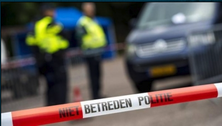Jeroen GeritsJeroen was one of the Heads of Special Interventions (SGBO) for the Amsterdam Police Force. Currently he is (Gold) Commander in national police operations and consultant & trainer at Futureteaming.  My phone rings. It suddenly wakes me up after an exhausting 24-hour shift and I instantly focus on a nervous voice. The surveillance team has just confirmed the identity of an Eastern European hitman. Our next emergency assignment is to make a safe arrest while nobody gets injured or killed. I quickly notify all team members to meet at the Police Headquarters and brief my intel to execute a professional arrest. As usual, this briefing comes with a back-up plan and emergency measures should things go wrong. Before stepping out into a warm summer afternoon I check if everyone is mentally ready. This is one of those assignments to test if our training, practice, experience and emotional resilience are up to the task. Why? Our intel says this hitman will try to get away by all means necessary. He has killed (police officers) elsewhere before. So no room for error should he draw his gun. Did we make the arrest? Yes, we did. Did we get away without a scratch? Yes, we did that too. Did the hitman get hurt? Let’s say he did not enjoy the whole experience altogether... Did everything go as planned and briefed? No, it did not. That’s exactly where this briefing made the difference! Let me tell you what happened. On arrival, we only had a few minutes to get in position. Unfortunately, we couldn’t get close to his hide-out and we stood out in public wearing bulky body protection. Last but not least, we thought he would be by himself. Wrong again! The guy left his hide-out ‘the unexpected way’: joined by another potential hitman! On their way out, only two of my team members were positioned along their escape route, with no back-up close by, so they initiated the back-up plan without delay. Walking towards the hitman and his partner – with their hearts jumping double digits – my two team members tried to act like cheerful buddies going for a stroll without paying any attention to the hitman in front of them. At the same time both team members saw us running like madmen in the back. When would the hitman notice us sprinting and closing in and how would they react? Then out of nowhere….the hitman stumbles and in a split second, the two team members crash into both suspects and wrestle them to the ground shouting ‘Police, police, don’t move!’. Both men were arrested and taken into custody: success! So, why is it so important for high-risk action teams – small groups of highly interdependent team members put together for a specific task, project or mission – to brief? Firstly, – see Steven’s checklist in his last post – it has to do with clarity. Even if we know we might have to change the plan if the situation becomes VUCA, sharing information, setting boundaries for behaviour, talking through scenarios, and establishing roles is key. It enables all team members to quickly adapt to whatever we need to deal with (the hard part). If you like to watch movies about military missions or SWAT operations there is always this briefing scene. Tense and committed team members talking through the mission: that's the clarity and the “easy” part. Secondly, a briefing is also one of the very few moments everyone’s together. As a leader, it’s a key moment to surface troubling emotions and from there, build connections and check if everyone has the right mindset. Only then are we fully ready for action and do our job leading by example: never ask the team to do things you are not willing to do yourself. Besides my job with the police I study and research effective team connection, and briefings form the foundation for performance. Briefings are a fundamental strategic theme for the National Police at all levels, and research tells us that there is room to continuously improve the quality and execution. The same goes for briefings (and even meetings) in other organisations, where safety might not play a role but teams do operate in an environment where speed and collaboration are key success factors (e.g. agile teams in tech). Most of the time it really comes down to the leader in charge to make the best of it. So what does being in charge mean? In my many years of experience I developed three rules for making sure me and my team check-in, connect with each other and focus on our task:
In my next blog, I will be talking about closing the feedback loop and how to make your team even more effective: the debrief! Until then stay safe! Jeroen
0 Comments
Leave a Reply. |
